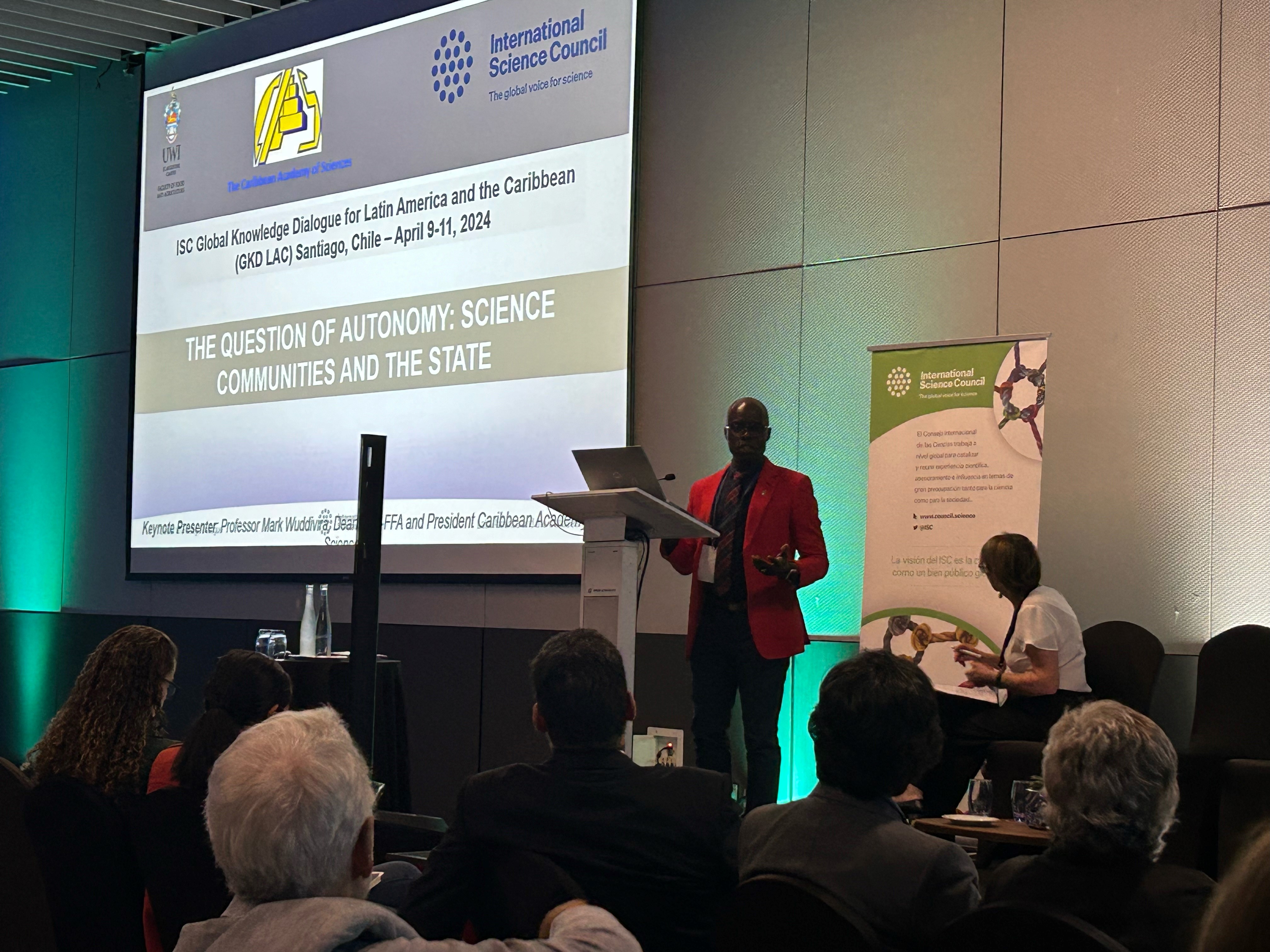News Releases
UWI Professor’s Keynote Address Champions Scientific Autonomy in LATAM & Caribbean
For Release Upon Receipt - May 22, 2024
St. Augustine
ST. AUGUSTINE, Trinidad and Tobago. May 22, 2024 - Professor Mark Wuddivira, Dean of the Faculty of Food and Agriculture at The University of the West Indies (The UWI), St. Augustine Campus, President of the Caribbean Academy of Sciences (CAS), and International Science Council (ISC) SIDS Liaison Committee member, delivered a keynote address at the Global Knowledge Dialogue for Latin America and the Caribbean (GKD LAC) in Santiago de Chile from April 9-11, 2024. Organized by the International Science Council (ISC), the event gathered scholars, policymakers, and scientific leaders to advocate for science in LAC.
In his speech titled "The Question of Autonomy: The Critical Relationships between Academies, Disciplinary Bodies, Unions, and International Scientific Organizations, and the State," Professor Wuddivira explored the autonomy of scientists in conducting research emphasizing the roles of science and research in enhancing quality of life and sustainability. He highlighted the importance of maintaining independence of scientific communities while fostering collaboration with governmental bodies.
Addressing key issues, including scientific community influence on public policy and strategies for strengthening autonomy, Professor Wuddivira emphasized the significance of autonomy in innovation and scientific progress. His insights prompted lively discussions and calls to safeguard autonomy and intellectual freedom, which are cornerstones of scientific inquiry and discovery.
Recognizing the Caribbean Academy of Sciences' role in providing expert advice, Professor Wuddivira urged governments to embrace its authority. He emphasized the importance of upholding autonomy and intellectual freedom to drive positive change through evidence-based decision-making.

Professor Mark Wuddivira, Dean of the Faculty of Food and Agriculture at The University of the West Indies, St. Augustine Campus delivers a keynote address at the Global Knowledge Dialogue for Latin America and the Caribbean (GKD LAC) in Santiago de Chile
About The University of the West Indies
The UWI has been and continues to be a pivotal force in every aspect of Caribbean development; residing at the centre of all efforts to improve the well-being of people across the region.
From a university college of London in Jamaica with 33 medical students in 1948, The UWI is today an internationally respected, global university with near 50,000 students and five campuses: Mona in Jamaica, St. Augustine in Trinidad and Tobago, Cave Hill in Barbados, Five Islands in Antigua and Barbuda and its Open Campus, and 10 global centres in partnership with universities in North America, Latin America, Asia, Africa and Europe.
The UWI offers over 800 certificate, diploma, undergraduate and postgraduate degree options in Culture, Creative and Performing Arts, Food and Agriculture, Engineering, Humanities and Education, Law, Medical Sciences, Science and Technology, Social Sciences, and Sport. As the Caribbean’s leading university, it possesses the largest pool of Caribbean intellect and expertise committed to confronting the critical issues of our region and wider world.
The UWI has been consistently ranked among the top universities globally by the most reputable ranking agency, Times Higher Education (THE). In the latest World University Rankings 2022, released in September 2021, The UWI moved up an impressive 94 places from last year. In the current global field of some 30,000 universities and elite research institutes, The UWI stands among the top 1.5%.
The UWI is the only Caribbean-based university to make the prestigious lists since its debut in the rankings in 2018. In addition to its leading position in the Caribbean, it is also in the top 20 for Latin America and the Caribbean and the top 100 global Golden Age universities (between 50 and 80 years old). The UWI is also featured among the leading universities on THE’s Impact Rankings for its response to the world’s biggest concerns, outlined in the 17 United Nations Sustainable Development Goals (SDGs), including Good Health and Wellbeing; Gender Equality and Climate Action.
For more, visit www.uwi.edu
Contact
Marketing and Communications Department
- Tel.: (868)-662-2002 ext.2013/2014
- Email: marketing.communications@sta.uwi.edu

